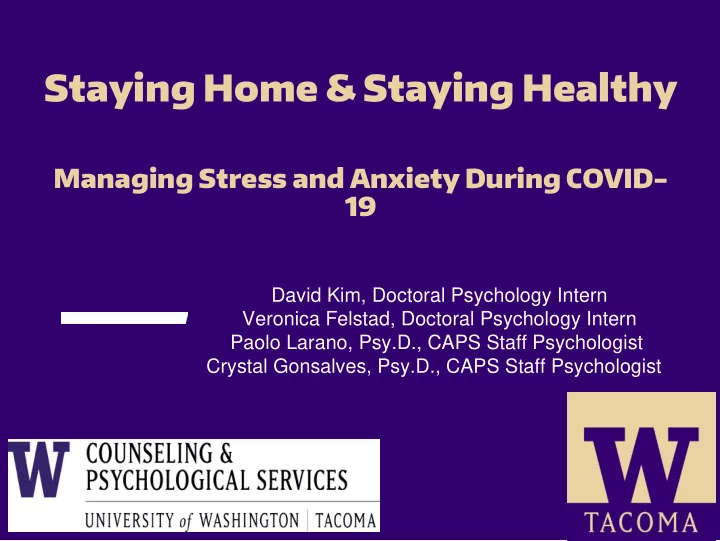

Staying Home & Staying Healthy Managing Stress and Anxiety During COVID- 19 David Kim, Doctoral Psychology Intern Veronica Felstad, Doctoral Psychology Intern Paolo Larano, Psy.D., CAPS Staff Psychologist Crystal Gonsalves, Psy.D., CAPS Staff Psychologist
Awareness of Stressors Duration of the pandemic Fear of infection Frustration & boredom Information overload
Self Care Tips Creating structure: making 1. schedules for home & school Healthy diet: impacts mental 2. health Developing healthy sleep 3. schedule to reduce stress Validation of emotional state 4. without comparative suffering Non-screen related activities 5.
Self Care Tip #1 Creating structure: making schedules for home & school 1. Adds an element of control & comfort • Provides a sense of accomplishment •
Self Care Tip #2 Food intake impacts mental health 2. Nutrients to feed your brain • Scheduling meals/snacks • Being mindful of food shaming • Physical Health Mental Health • Resources for food • The Pantry o The Giving Garden o Local Food banks o
Self Care Tip #3 Developing healthy sleep schedule to reduce stress 3. Employ good conditioning • Lack of Sleep Stress •
Self Care Tip #4 Validation of emotional state without comparative suffering 4. Comparative suffering = “How can I complain,” we ask • ourselves, “when I know people who have it so much worse?” Emotional state is on a spectrum and it is not binary • Apathy Empathy Comparative suffering downplays our own suffering •
Examples of Comparative Suffering “I feel bad for complaining about my family. I know that they are frustrating me, but some people are alone and without family. I shouldn’t feel annoyed with them.” “I shouldn’t feel this bad about what’s going on. Everyone is going through the same problems right now.”
Self Care Tip #5 Non-screen related activities 5. Music: Listen, Play, and Sing • Cooking: Solitary or in Group •
Summary Creating structure: making schedules for home & school 1. Healthy diet: impacts mental health 2. Developing healthy sleep schedule to reduce stress 3. Validation of emotional state without comparative suffering 4. Non-screen related activities 5.
Manage Stress and Anxiety
Managing Anxiety Information Overload Stay informed while avoiding exposure to excessive media •
Exercise/Movement Exercise that will get heart rate up: Dance Yoga Treadmill Walking (dog, cat, dragon) Jumping jacks Jumping rope Joyful Movement!
The Power of the Mind What can I control and what I cannot control? Within My Control Outside My Control Building a routine Other’s people’s decisions Information Intake Government’s actions Exercising UWT opening or closing Seeking support The news
Techniques Mindfulness-Based Stress Reduction (MBSR) Mindfulness Meditation Body Scan Progressive Muscle Relaxation Grounding with Your Senses Guided Visualization
Relaxed Breathing Diaphragmatic Breathing Hug your pet; stuffed animal; pillow!
Awareness of Thoughts & Feelings
Resources • https://thewellnesssociety.org/wp-content/uploads/2020/04/Coronavirus-Anxiety- Workbook.pdf • https://adaa.org/finding-help/coronavirus-anxiety-helpful-resources • https://www.theawakenetwork.com/free-online-meditation-resources-for-the-time-of- social-distancing/ • https://www.actmindfully.com.au/wp-content/uploads/2020/03/FACE-COVID-eBook- by-Russ-Harris-March-2020.pdf • https://www.apaservices.org/practice/ce/self-care/health-providers-covid-19 • https://www.actmindfully.com.au/wp-content/uploads/2020/03/FACE-COVID-eBook- by-Russ-Harris-March-2020.pdf • https://www.psychologytools.com/assets/covid- 19/guide_to_living_with_worry_and_anxiety_amidst_global_uncertainty_en-us.pdf • https:
References (Self-Care) Gutierrez, E.O.F. & Camarena, V.A.T. (2015). Music therapy in generalized anxiety disorder. The Arts in Psychotherapy , 44(2015), 19-24. http://dx.doi.org/10.1016/j.aip.2015.02.003 Hareli, S. & Hess, U. (2012). The social signal value of emotions. Cognition and Emotion , 26(3), 385-389. http://dx.doi.org/10.1080/02699931.2012.665029 Hill, K.H., O’Brien, K.A., & Yurt, R.W. (2007). Therapeutic efficacy of a therapeutic cooking group from the patients’ perspective. Journal of Burn Care & Research , 28(2), 324-327. doi: 10.1097/BCR.0B013E318031A24C Iqbal, S. & Bassett, M. (2008). Evaluation of perceived usefulness of activity scheduling in an inpatient depression group. Journal of Psychiatric and Mental Health Nursing , 15, 393-398. Khan, S. & Khan, R.A. (2016). Healthy diet a tool to reduce anxiety and depression. Journal of Depression & Anxiety , 5(1), 1-3. doi: 10.4200/2167-1044.1000220 Sherman, H., Genzer, Y., Cohen, R., Chapnik, N., Madar, Z., & Froy, O. (2012). Time high-fat diet resets circadian metabolism and prevents obesity. The FASEB Journal , 26, 1-10. doi: 10.1096/fj.12-208868 Staner, L. (2003). Sleep and anxiety disorders. Dialogues in Clinical Neuroscience , 5(3), 249-258.
References (Managing Stress & Anxiety) American Psychological Association. (2020, April 14). Coping with COVID-19-related stress as a student. http://www.apa.org/topics/covid-19/student-stress American Psychological Association. (2020, April). Nurtured by nature. Monitor on Psychology, 51 (3). http://www.apa.org/monitor/2020/04/nurtured-nature Coronavirus Anxiety Workbook. (2020, March). Retrieved April 5, 2020, from https://thewellnesssociety.org/wp-content/uploads/2020/04/Coronavirus-Anxiety- Workbook.pdf Garfin, D. R., Silver, R. C., & Holman, E. A. (2020). The novel coronavirus (COVID- 2019) outbreak: Amplification of public health consequences by media exposure . Health Psychology . Advance online publication. https://doi.org/10.1037/hea0000875 Vivyan, C (2010) Thought record sheet – 7 column. www.hetselfhelp.co.uk
Recommend
More recommend